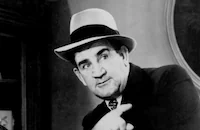Caught
Cast & Crew
Edward Sloman
Richard Arlen
Louise Dresser
Frances Dee
Tom Kennedy
Martin Burton
Film Details
Technical Specs

Synopsis
The legendary Calamity Jane, now nearing middle-age, runs a successful saloon and rustles cattle as a sideline. Her manager, Jard Harmon, brings Kate Winslow to work as a saloon girl, but Kate is unable to compromise her virtue to do the work. Despite her gruff demeanor, Jane shows she has a good heart by hiring Kate anyway. When local ranchers Haverstraw and Bradford come to the saloon to find Curly Braydon, one of Jane's rustlers, Jane turns Curly in to protect herself. Using a gun Jane provided him, Curly manages to get away, however, and the ranchers call in the cavalry. Lieutenant Tom Colton rides into town with his troop and is attracted to Kate. They fall in love while Tom investigates the situation. Tom eventually arrests Curly, whose girl friend tells him that Jane is the leader of the thieves. Curly tries to escape and kills a cavalry officer, but is shot himself. Jane kidnaps Tom before he can arrest her and hides him in her storeroom. Based on information from Kate, Jane suspects that Tom is her long-lost son, and her suspicions are confirmed after she talks with him. Although he remains unaware of their real relationship, Jane finds she is unable to kill Tom as planned and allows Kate to free him, warning her own men that they should clear out quietly. Jane makes her getaway with Jard, and Kate uses her influence to prevent Tom from tracking them down. In the mountains, Jane and Jard realize that they will spend the rest of their lives on the run.

Director
Edward Sloman
Cast

Richard Arlen
Louise Dresser

Frances Dee

Tom Kennedy
Martin Burton
Marcia Manners
Sid Saylor
Guy Oliver
E. J. Le Saint
Charles K. French
Lon Poff
Jack Clifford
Crew

Film Details
Technical Specs

Articles
Frances Dee (1907-2004)
She was born Jane Dee, on November 26, 1907 in Los Angeles, California. She was the daughter of an Army officer who grew up in Chicago after her father was transferred there when she was still a toddler. After he was re-stationed to Los Angeles in the late '20s, Jane accompanied him back.
Although she didn't harbor any serious intentions of becoming a star, Dee, almost out of curiosity, found work in Hollywood as an extra. With bit parts in small features in the films Words and Music (1929), True to the Navy, and Monte Carlo (both 1930), it didn't take long for studio executives to take notice of the sleek, stylish brunette. They changed her first name to Francis, and gave her a prominent role opposite Maurice Chevalier in one of the first all-talking musicals, The Playboy of Paris (1930).
She proved she could handle drama in her next big hit, An American Tragedy (1931) as Sondra Finchley, the role played by Elizabeth Taylor in the George Stevens' remake A Place in the Sun (1951). She met her husband Joel McCrea while filming The Silver Cord (1933), and after a romantic courtship, were married that same year in Rye, New York. It was well-known within film industry circles that their 57-year marriage (ending in 1990 when McCrea passed away) was one of the most successful among Hollywood stars.
From there, Dee played important leads in several fine motion pictures thoughout the decade: Little Women (1933), starring Katharine Hepburn; Blood Money (also 1933), where she was cast thrillingly against type as a sex-hungry socialite whose taste for masochistic boyfriends leads to harrowing results; Of Human Bondage (1934), in which she played Leslie Howard's devoted girlfriend; The Gay Deception (1935), a charming romantic comedy co-starring Frances Lederer; Wells Fargo (1937) a broad sweeping Western where she again teamed up with her husband McCrea; and the classic period epic If I Were King (1938) making a marvelous match for Ronald Colman.
Dee's film career slowed considerably in the '40s, as she honorably spent more time raising her family. Still, she was featured in two fine films: the profound, moving anti-Nazi drama So Ends Our Night (1941) with Fredric March; and Val Lewton's terrific cult hit I Walked with a Zombie (1943), portraying the inquisitive nurse trying to unravel the mystery of voodoo occurrences on a West Indian plantation. Dee officially retired after starring in the family film Gypsy Colt (1954) to commit herself full-time to her children and her husband.
For those so inclined, you might want to check out Complicated Women (2003), a tight documentary regarding the racy Pre-Code films that represented a realistic depiction of the Depression-era morality before the Hays code took over Hollywood in 1934. Frances Dee, although well in her nineties, offers some lucid insight into her performance in Blood Money, and clearly demonstrates an actor's process of thought and understanding in role development.
She is survived by three sons including the actor Jody McCrea, who found fame as "Bonehead" in the AIP Beach Party films of the '60s, six grandchildren and two great-grandchildren.
by Michael T. Toole

Frances Dee (1907-2004)
Quotes
Trivia
Notes
A story in the Paramount story files at the AMPAS library, dated February 3, 1929 and titled "Legend of the West" was written by Norman Burnstine. Early scripts by Agnes Brand Leahy and Keene Thompson are titled Roped In, and include James Mason as "Scully." Calamity Jane, a nineteenth century frontier woman whose real name was Martha Burke, was known chiefly because of her habit of donning men's clothes and her marksmanship. In the late 1890s she appeared in Wild West Shows and performed in the 1901 Buffalo Pan American Exposition.














